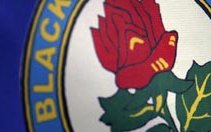Retroflair 31 gives us a blast from the past, doing some first hand research on a Rovers Legend of many years ago, Arnold Whiteside….
Arnold Whiteside
Position: Right Half
Games: 416
oals: 3
Promotion winner: 1939
2nd Division League Championship: 1939
10th highest all time games for Blackburn Rovers
Summary:
Small, skilled and strong, Arnold Whiteside was never beaten twice. Bringing the club through the great depression, financial distress and the Second World War, Whiteside overcame the odds to become one of Blackburn`s finest.
Career:
Arnold Whiteside was born in Calder Vale in 1902. He worked as a weaver at a cotton mill and played football for his local side Woodplumpon Juniors until March 1932, where he was signed by then Blackburn manager Arthur Barritt. Six weeks after this signing, the small right half made his 1st team debut against Liverpool.
No one before or since has made the leap from obscurity to infamy quite as quick as Arnold Whiteside. His debut was greeted with no fanfare or excitement- people simply had no idea who he was and no one thought a boy his size could play the game. Here`s how local newspapers at the time described him:
Lacking the advantage of height and poundage”
Not built for knockabout processes”
“Midget half back”
But despite his build, Whiteside became a mainstay across the half back line and became known for his skill, quick thinking and strength on the ball.
Whiteside`s injection into the squad came at a time Blackburn was struggling. It was 1932 and the great depression had thrown the legendary Rovers of the early 20th century into disarray. Senior players were being sold for small compensation and inexperienced youth were expected to take up the slack. Whiteside stuck to the impossible task of keeping Rovers in First Division football with a tenacity and candour that earned him the nickname “little gentleman”.
The inevitable relegation came in 1936, with Blackburn in real financial and on field trouble. The manager that signed Whiteside, Arthur Barritt, resigned amid great controversy and discontent. Blackburn looked like they would fall further into obscurity, positioned in the relegation zone that would have seen them demoted to Third Division North. It was then the great Mr Blackburn, Bob Crompton took back the reigns at Ewood Park and set about stabilising the club.
Buying players on the cheap and embracing a new style of quicker play, Crompton fashioned a Championship winning squad from a side that just a year prior had been on the brink of another relegation. A large part of Rovers rediscovered success was Whiteside`s partnership with fellow Blackburn great Bob Pryde. Together, they provided the link between defence and attack, with Whiteside`s tenacity and quick thinking complementing Pryde`s class on the ball.
As a player, Whiteside had built a massive reputation. He was highly sought after, with Tottenham, Liverpool and Arsenal all making plays for the now established right half. Blackburn turned down all offers. It wasn`t just Whitesides` impact on field, with his trickery and tackling creating and stopping opportunities at either end, but his appeal to the Lancashire public. Whiteside brought people though the gates at Ewood Park. The “little gentleman” was the complete story. He had come from nowhere and made a massive impact. He resisted offers of riches to stay at the club that gave him his chance and he overcame natural impediments in his size and weight to earn the respect of his opponents.
Arnold Whiteside stuck with a relegated Rovers side and in 1939, was rewarded with the2nd Division Championship and promotion to the top flight of English football.
Unfortunately, the success would not last due to the looming spectre of war.
WWII
The break out of the Second World War stopped the 1939/40 Football League competition. Whiteside was in the prime of his career and the Championship side looked serious contenders at the top level. But when war broke out in September 1939, football was put into perspective. The side that had taken Rovers to silverware would never be together again.
The full impact of war was felt in Blackburn as Championship winning Albert Clarke was killed in action in 1944. While the side had not played together for 7 years, it was a triumphant but sad occasion when the football league resumed in 1946. The motherland had won the war, but the losses were great.
End of Career
n 1949, Arnold Whiteside played his last game for Rovers. While the war had taken some of the best years of his career away, he still showed signs of the great player that had graced Ewood Park for 17 years. It was perhaps fitting that when Whiteside left Rovers, it was to play a final season with his old partner Bob Pryde, who was now Captain/Coach of Wigan.
The “little gentleman” would never again wear the blue and white halves, but his memory and the memory of all the Rovers that took our club through a generation of depression, financial stress and war should never be forgotten.
Superb research and article by my fellow Aussie. Cheers for going to such an effort
If any VBER would like to submit an article, please feel free to contact Delap, Bom, Walker or myself, and we will gladly post it up for you.
Check the ‘Vital Blackburn Menu tab’ for a range of topics to discuss



